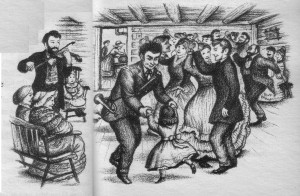This dance account is taken from Laura Ingalls Wilder’s book Little House in the Big Woods. Set in rural Wisconsin. Though published in the 20th century, it is a recollection from her childhood around 1871:
———————————-
Dance at Grandpa’s
Then Pa took his fiddle out of its box and began to play, and all the couples stood in squares on the floor and began to dance when Pa called the figures.
“Grand right and left!” Pa called out, and all the skirts began to swirl and all the boots began to stamp. The circles went round and round, all the skirts going one way and all the boots going the other way, and hands clasping and parting high up in the air.
“Swing your partners!” Pa called, and “Each gent bow to the lady on the left!”
They all did as Pa said. Laura watched Ma’s skirt swaying and her little waist bending and her dark head bowing, and she thought Ma was the loveliest dancer in the world. The fiddle was singing:
“Oh, you Buffalo gals, Aren’t you coming out tonight, Aren’t you coming out tonight, Aren’t you coming out tonight, Oh, you Buffalo gals, Aren’t you coming out tonight, To dance by the light of the moon?”
The little circles and the big circles went round and round, and the skirts swirled and the boots stamped, and partners bowed and separated and met and bowed again.
In the kitchen Grandma was all by herself, stirring the boiling syrup in the big brass kettle. She stirred in time to the music. By the back door was a pail of clean snow, and sometimes Grandma took a spoonful of syrup from the kettle and poured it on some of the snow in a saucer.
Laura watched the dancers again. Pa was playing “The Irish Washerwoman” now. He called:
“Doe see, ladies, doe see doe, Come down heavy on your heel and toe!”
Laura could not keep her feet still. Uncle George looked at her and laughed. Then he caught her by the hand and did a little dance with her, in the corner. She liked Uncle George.
Everybody was laughing, over by the kitchen door. They were dragging Grandma in from the kitchen. Grandma’s dress was beautiful, too; a dark blue calico with autumn-colored leaves scattered over it. Her cheeks were pink from laughing, and she was shaking her head. The wooden spoon was in her hand.
“I can’t leave the syrup, “she said.
But Pa began to play “The Arkansas Traveler,” and everybody began to clap in time to the music. So Grandma bowed to them all and did a few steps by herself. She could dance as prettily as any of them. The clapping almost drowned the music of Pa’s fiddle.
Suddenly Uncle George did a pigeon wing, and bowing low before Grandma he began to jig. Grandma tossed her spoon to somebody. She put her hands on her hips and faced Uncle George, and everybody shouted. Grandma was jigging.
———————————————-
Single fiddler, lots of guests, homemade food, and fancy clothing. The fiddler is calling out the figures:
“Grand right and left!”
“Swing your partners!”
“Each gent bow to the lady on the left!”
“Doe see, ladies, doe see doe, Come down heavy on your heel and toe!”
